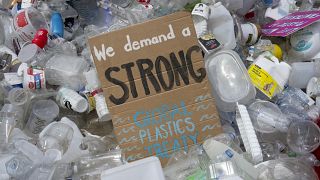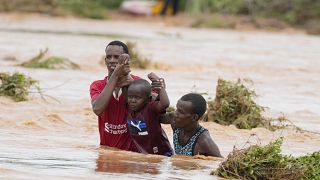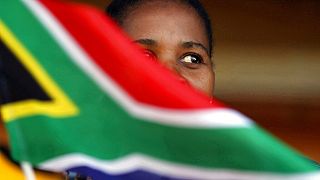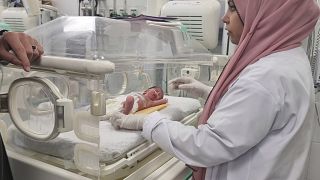Kenya
**The Athi River, on the outskirts of Kenya’s capital Nairobi, is choked by plastic and other waste.**There's no piped water or sewage system in the area, and drought has made clean water supplies more scarce and expensive.
Twice a week, trucks with 5,000 to 10,000 liters (1,300 to 2,600 gallons) of water will fill up vending stations across Athi River, where residents can buy 20 liters (five gallons) for 20 Kenyan Shillings ($0.16).
A household of four needs about five gallons a day, weekly incomes are about $13, according to data from Kenya’s Finance Ministry.
Many rely on unsafe alternatives if they miss out on the trucked-in stocks.
Forty-six-year-old resident Joyce Ngui takes a yellow jerrycan, and heads to a swamp, to draw water to clean her family's clothes and for cooking.
“Sometimes, we get to the water vending stations and find that the queue is long and then the water finishes and you have to wait,” says Ngui.
“Most of the time, you don’t have money to buy even the salty water sold around. So, we have no choice but to use the swamp water."
Part of the slimy swamp is clogged with overgrown water lilies.
Ngui doesn’t have a water filter, so she can’t turn the swamp water into something suitable for drinking.
Ngui would like a filter, “so that we can be able to filtrate the dirty water and be able to drink it,” she says. Otherwise, “it just has germs and diseases.”
For residents whose homes are kitted out with water filters, distributed by a local nonprofit, the nearby river — though polluted, prone to drought and usually unsafe for drinking — is becoming a cheaper and sometimes more reliable source of clean water.
And while advocates say underlying issues like climate change-fueled drought and poor water management need to be urgently addressed, solutions like filters make a short-term difference because deliveries are often not enough for the neighborhoods’ needs.
Nonprofit organization, Bucket Ministry, has been providing communities around Nairobi and other parts of Kenya with the easy-to-use water filters.
It provided over 600 filters, made by water filtering company Sawyer, to households in four neighborhoods on Athi River since August and plans to up that number to 6,000.
The devices are the size of a small water bottle and are fitted with a hose pipe onto a bucket.
They can filter water from the river and nearby swamps into potable water that can be used by residents.
Resident Josephine Mutile, who owns a water filter, is already seeing the benefits.
“I have been sick often and visiting the hospital where I am tested and told that I have typhoid, or a parasite or diarrhoea. Boiling water (to kill viruses and bacteria) is expensive because cooking gas is expensive,” says Mutile.
“Now I have this filter, it will help me a lot.”
“It filters every germ or pathogen that causes water-borne diseases," explains Derrick Mesulamu, country director for the group.
“It is designed in such a way that it has micro holes that don’t allow those particles that cause water-borne diseases to pass through.”
Historically, Athi River is a water-scarce region, grasslands turned brown from the scorching sun and huge tracts of land were left untilled as residents couldn't farm the drylands.
Consecutive seasons of failed rains and drought, driven by human-caused climate change and consecutive naturally occurring La Nina weather phenomena, have worsened shortages.
“Climate change has had a very long term and short term devastating impact on water resources in Kenya, and especially the drylands,” says Namenya Daniel Naburi, an environmentalist and climate change expert from the Africa Nazarene University.
“We’ve seen most of resources, especially surface water, has been declining due to the effects of climate change.”
Machakos' local government has been desilting and cleaning up the river, but most of the pollution, including plastic bags and bottles, happens upstream, where residents in poorer areas of Nairobi dump waste into the Nairobi River that then flows into the Athi River.
Local authorities say they are cracking down on industries that have been disposing chemical waste and other pollutants into the Athi River.
Jarim Omogi, head of the community health department at Amref International University, says water scarcity is an issue across Kenya.
"44 out of 100 people (in Kenya) are unable to access clean and safe drinking water. That tells you the number of diseases that comes in the community and leave alone that, the amount of money the government has to use to take care of those that are sick because of what we could have avoided simply because of lack of water."
Data from Machakos County health ministry, of which Athi River is a part, says 4 out of 10 cases at public health clinics in the area are related to water-borne disease.
At least 10 people died following a cholera outbreak in Mavoko area in the region between October last year and March.
Elizabeth Mwikali, another resident of Athi River basin, says the water filter has improved her family's health.
"When we didn't have this (filtering) bucket, we were really suffering. We were always in and out of hospitals because the water we were using was dirty. Even after boiling it, not all germs are killed. My kids were complaining, my husband was complaining, they had diarrhoea, stomach aches and typhoid," she says.
"But when we got this bucket, we have been filtering water now, and all our health issues are gone."
Experts say that while water filters are worthwhile, for a project like this to work, it will need to be scaled up to reach millions of people in a similar situation to residents by the Athi River.













01:02
Pics of the day: April 25, 2024
01:35
Kenya: Local anti malaria drug production signals progress
01:02
Pics of the day: April 24, 2024
01:40
Nairobi residents grapple with floods aftermath
02:29
"Efficient food systems key to tackling food waste", UNEP programme manager
01:02
Pics of the day: April 23, 2024